Gareth Jenkins, the senior Fujitsu engineer who gave evidence as an expert witness in around 15 sub-postmaster trials, faces day two of questions at the Post Office Inquiry
4.15pm: Beer goes to Jenkins’ final witness statement, pointing out there was indeed no direct reference to system failures.
‘It would appear Mr Ward has been successful in causing the alteration of your evidence?’ asks Beer.
‘Yes, but I still stand by what it actually says there as being an accurate representation of what had happened within the system,’ says Jenkins.
Beer says he was a ‘willing actor’ in the process. Jenkins says he had taken out the emotive words which Ward was not happy with.
The inquiry then sees a further email from Ward to a colleague in March 2006 complaining that Jenkins’ statement was taking so long to be put together. Ward wrote: ‘I do not understand the confusion as I thought I’d made our requirements clear.’
Jenkins admits that he did amend his statement following this email.
Beer: ‘Mr Ward expressed his concerns on numerous occasions over your wording including in your witness statement system failures. He told you that system failures were potentially very damaging to mention. He told you that you should not mention them and that they were a really poor choice of words. Did all of that pile pressure on you to remove the reference to system failures from your witness statement?’
Jenkins: ‘Clearly I did that as a result of that but I was happy with the wording that I ended up with.’
Beer: ‘Did you ever go back to any lawyer within Fujitsu to say "look I am being embroiled in a criminal prosecution here, I am being asked to sign witness statements off and there is this man from the Post Office who is applying pressure on me to change the substance of my evidence"?’
Jenkins: ‘No I didn’t but I clearly understand now that I should have done.’ Beer says he will move on next to the Seema Misra case. All back at 9.45am tomorrow.
4pm: Beer puts Jenkins’ note about him not having produced any spreadsheets next to Jenkins’ final witness statement presented to court. In that statement, he stated: ‘I extracted data from this system.’ Beer points out that according to his own notes, he had not.
Jenkins accepts this is how it looks now and that ‘I had not thought it through in that way at that time’. He cannot remember why he decided to change his stance about whether he had obtained the data himself.
3.50pm: Jenkins’ notes on Ward’s suggestions are in yellow (see below). Jenkins states that spreadsheets have been inserted in the draft witness statement which he had nothing to do with, adding: ‘For all I know, you could have typed them up from scratch.’
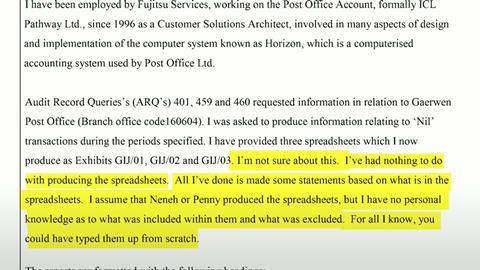
3.40pm: Jenkins says Ward had no technical knowledge. He saw Ward as trying to approve the wording and did not think it was inappropriate at the time.
Beer points out that Jenkins made a statutory declaration that this was his personal witness statement. Jenkins accepts this is correct.
Jenkins ultimately replied to Ward adding some annotations and asked Ward: ‘Does this move us forward?’
The room has gone very quiet now. Perhaps the most tense moment of Jenkins’ appearance so far.
Beer asks: ‘Did you regard this as some kind of negotiation in which you are required to haggle with the Post Office about the way in which you describe the Horizon system and whether it had defects?’
Jenkins: ‘I suppose in a way I probably did. That was what I was used to when writing technical documents, that I would receive comments on them and then make updates based on the comments I had received and then update the next draft of a document. I saw this as being a similar sort of process.’
3.35pm: Ward's suggested changes to the draft statement are shown to the inquiry (see below). In particular he struck through any reference to system failures being normal occurences, making clear this might support the sub-postmasters' defence.
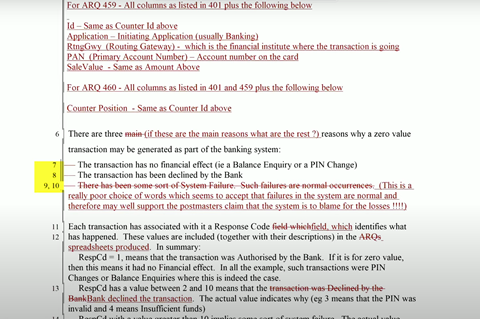
3.30pm: Beer asks: 'Do you agree that Mr Ward was seeking here directly to influence the contents of your witness statement in criminal proceedings before the Crown Court?'
Jenkins: 'I think that could be interpreted in that way, yes.'
Beer: 'What did you think about this attempt by the Post Office to alter your evidence?'
Jenkins: ‘I don’t think I interpreted it in quite that way at the time. I just saw it as being a way of improving the wording of what I had in the statement rather than trying to alter what I was trying to say.’
3.25pm: Back after a break. Documents from the time show there were serious concerns about the draft statement produced for the Thomas case. Post Office investigator Graham Ward said Jenkins’ line that system failures were a ‘normal occurrence’ was ‘potentially very damaging’ and suggested someone from the team should take a statement directly from Jenkins.
Ward went on: ‘Whilst there is some urgency with this, it is more important to get it right and ensure we are not embarrassed at court, which we certainly would be if we produced a statement accepting system failures are normal occurrences.’
3.05pm: Jenkins was never told the facts of the Thomas case or a summary of the prosecution case. He did not understand the legal implications or preparing a witness statement, nor did he ask for any guidance.
‘I thought I was doing a simple bit of analysis,’ he tells the inquiry. ‘I thought it was a relatively straightforward bit of information I could provide.’
But documents from the time show that Jenkins expressed doubts about the truthfulness of what was being said in two paragraphs of his draft statement. In his written statement to the inquiry he addresses this, saying he was actually expressing doubts about the proper operation of the computers involved in producing the draft statement for the Thomas case.
‘You couldn’t honestly believe that?’ asks Beer.
‘I couldn’t see any other way that that paragraph makes sense,’ Jenkins replies.
‘Is the truth of the matter that this explanation is one you have come up with after the event to explain away this comment in the draft witness statement that you didn’t think you could include the last two paragraphs?’
‘The only way it can make any sense is by the explanation that I have come up with.’
Noel Thomas, from Anglesey, was jailed for false accounting in 2006 after his books appeared to fall short by £48,000. He spent 13 weeks in prison but his conviction was overturned some 15 years later.
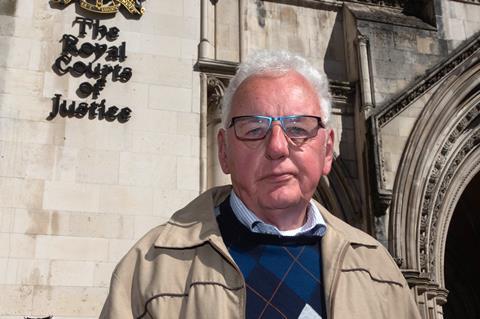
2.50pm: Jenkins was contacted by Post Office for a statement in March 2006 relating to Thomas’ case. This should address transactions and online banking. He provided a response asking about the scope of the request.
Beer asks if he was preparing a witness statement. Jenkins suggests he did not know at this stage what a witness statement was, although Beer reminds him he had been involved in preparing one before.
Beer tells the inquiry that no-one has been able to find the statement that was ultimately produced.
Jenkins asked a Fujitsu colleague ‘how do you want to play this?’. He says he wanted to know what he should do next. Investigators were then worried about his statement mentioning ‘system failure’, something which Beer says had ‘scared the horses’.
2.40pm: The Post Office insisted that the scope of Jenkins' report be limited. It did not address various reasons for discrepancies or issues that were reported by sub-postmasters. Jenkins said the purpose of the document was 'quite narrow'. To present this to the court as evidence of Horizon integrity was 'inadequate', suggests Beer.
Jenkins says his report shows the integrity of the audit trail which was presented to the courts, but he did not understand the 'legal niceties'.
We now move on to some case studies, starting with Hughie Thomas, who ran branches in north Wales.
2.20pm: Jenkins’ report on Horizon data integrity was headlined ‘commercial in confidence and without prejudice’. He tells the inquiry someone asked him to mark it this way and he has ‘no idea’ what it means apart from it is ‘some sort of legal thing’. He cannot remember who asked him to put these words in.
He was not told this report was being prepared ahead of litigation or for the purposes of obtaining legal advice. No-one mentioned it might be used in legal proceedings.
Jenkins’ report began by saying that the document was submitted to Post Office ‘for information purposes only and without prejudice’. Again he repeats he does not know what this means.
2.10pm: Jenkins was asked by Post Office to prepare two reports on Horizon and believed this was related to prosecutions and was not to be used for any other purpose. The Post Office used these reports in briefings to MPs and in statements to show that Horizon was reliable. Jenkins says he was asked to analyse quite small elements of Horizon rather than make a sweeping endorsement and did not know they would be shared widely.
12.55pm: And now Jason Beer can't stop coughing, which is proving to be a challenge given he is supposed to be asking questions. He soldiers on before chair Sir Wyn Williams (who is here in person) suggests everyone takes an early lunch. A quick trip to Boots for Beer.
12.50pm: In November 2012, Helen Rose, a member of the Post Office security team, emailed Jenkins expressing her concern that the prosecution ‘would not be giving a true picture’ in court because they were only using limited branch transaction logs. Jenkins disputes this was happening at the time.
Beer asks if existing data being relied on by prosecutors was not giving a full picture, showing that Jenkins himself replied to Rose saying they could add extra data. The Post Office did not pursue the idea of providing more information to defence teams.
12.30pm: The inquiry sees this email (below) from Jenkins in reply to lawyer Michael Harvey asking for precise information about remote access, after two sub-postmasters had raised it as an issue. Jenkins said injected transactions would be 'visible'.
He accepts now his response was wrong and he was relying on what he thought he knew. He agrees that he adopted this approach of not checking even when information was being provided for court proceedings.
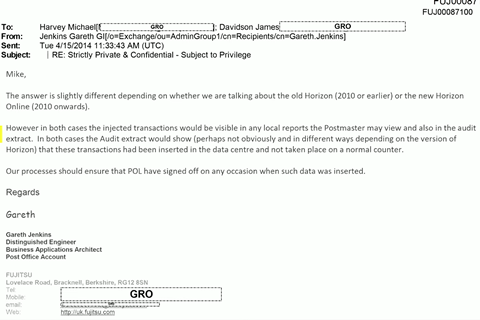
12.15pm: In November 2012, Cartwright King solicitor Rachael Panter emailed Jenkins asking for him to provide an urgent expert report in the case of accused sub-postmistress Kim Wylie. Defence solicitors had made a request for further disclosure about the integrity of the Horizon system, and Panter asked if Jenkins could include a paragraph in his statement saying there were no issues with Horizon.
His subsequent ‘bolt-on’ to his witness statement said that while remote access to branch accounts was possible, any changes were very rare and had to be authorised by Post Office Ltd. In the Wylie case, he added, it was ‘highly unlikely’ this had happened.
He tells the inquiry his understanding about this in 2012 was from ‘informal conversations’ with the service support centre. He believed there was a mechanism for Post Office to sign off any changes.
Beer says Jenkins knew there was a wider form of remote access that was not included in the available data. Jenkins replies that he ‘didn’t think of it’ at the time.
12.05pm: The inquiry hears that the Fujitsu Service Support Centre had unrestricted and unaudited access to branch counters. Yet Jenkins claims not to have realised this until he was told about it in preparation for the inquiry.
Beer asks if this was knowledge that Jenkins should have had when he gave oral evidence in the Seema Misra trial. He accepts that with hindsight he should have done. He admits he did not enquire further to check what remote access was possible.
11.55am: Back after a longer break than usual and Jenkins still being pressed on remote access. Beer trying to test Jenkins’ knowledge about remote access, which he insists was very limited until 2018. The inquiry goes to the evidence of Second Sight forensic accountant Ian Henderson, who said earlier this month that he met with Jenkins at Fujitsu in September 2012.
Henderson submitted that Jenkins confirmed there were 10 members of staff from Post Office permanently based at Fujitsu dealing with Horizon bugs.
Henderson added: ‘Gareth Jenkins told me that Fujitsu routinely used remote access to branch terminals for various purposes. This was often without the knowledge or specific consent of individual sub-postmasters.
‘He also told me that members of his team could connect remotely to branch terminals and generate keystrokes that were indistinguishable from a sub-postmaster accessing the terminal directly.’
Jenkins tells the inquiry that Henderson has mischaracterised the details of what he was told by Jenkins. He repeats that while he knew remote access was possible, he did not know in 2012 that it was being regularly done.
11.20am: Jenkins says he believed there was only very limited remote access to branch accounts right up until 2018. Until then he had only believed it was theoretically possible until then but not actually done. Despite being an expert witness on so many prosecutions, some of which involved the defence raising the remote access issue, he does not know why he was not told it was more widespread than he thought.
We go to the morning break.
11.10am: Beer moves on to remote access by Fujitsu staff into postmasters’ branch accounts, which is addressed specifically by Jenkins. This was raised as a possible line of defence by Seema Misra’s defence team in 2010. In his written statement to the inquiry, Jenkins says: ‘Aside from the fact that I was responding to his hypothesis, I understood then that remote access by Fujitsu was an exceptional and regulated course. There was nothing in Mrs Misra's case to have suggested that a need for remote access had ever arisen or that it could in any way explain ongoing losses in the region of £70,000. It was just not something that I had considered.’
10.40am: The inquiry also sees a draft statement, containing a mixture of opinion and fact, which was prepared by Bond Pearce solicitor Stephen Dilley. Jenkins says the purpose of this document was to set out what he should be saying in his final witness statement, and he gave no real thought about the form it should take. Beer asks if Dilley ever suggested that Jenkins needed to comply with his duties. 'Not that I am aware of,' replies Jenkins.
Sir Wyn Williams steps in to say he is unhappy that documents affecting this issue were not disclosed sooner and asks Beer to find out exactly who sent and received letters at the time.
Beer moves on to further discussion about early bugs in Horizon.
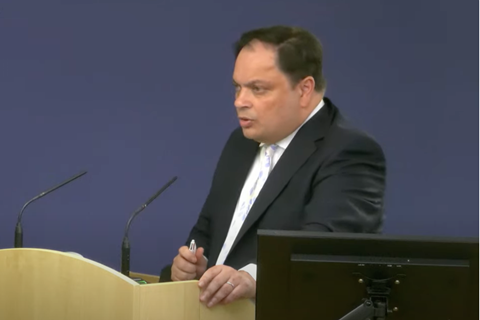
10.30am: Jenkins says that despite having apparently seen the Bond Pearce letter in 2006, he did not understand the requirements and duties of an expert witness. He would give oral evidence as an expert four years later in the Seema Misra trial.
'I had clearly not remembered about the fact I had seen this letter in 2006,' he tells the inquiry.
10.20am: The Bond Pearce letter matters because it goes to the heart of Jenkins' defence: namely that he did not understand and was not told about the duties of an expert witness. He accepts the letter is detailed and easy to understand and that he would have been informed on this basis the duties he needed to comply with.
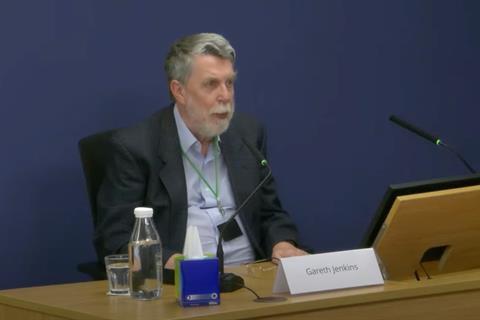
10.10am: Inquiry counsel Jason Beer KC goes back over an issue that came up yesterday: namely the letter written by Bond Pearce to Fujitsu in 2005 ahead of the Lee Castleton trial. Jenkins told the inquiry yesterday he did not see this letter and that he would have done things differently if he had.
He claimed not to have been made aware of his duties as an expert witness until 2020.
But the inquiry has now seen that the Bond Pearce letter was indeed sent to him and he would have seen it. He apologises to the inquiry for this mistake.
10am: A slightly later start than usual for the inquiry as Gareth Jenkins returns for his second day of oral evidence. Details of day one can be found here.
Jenkins will be asked in particular today about his relationship with Post Office lawyers and how they handled witness statements he was making to the court.



































